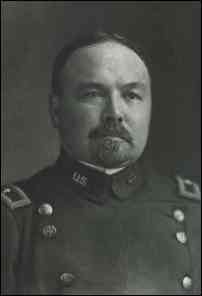
The War for Cuban Independence
Intro | Before The
War | The War Begins | U.S.
Intervention | After The War |
Sidebars: Frederick
Funston, American Insurrecto | Funston meets Gómez
|
Spanish-Filipino-American War |
An Excerpt from Mark Twain |
A
Poem: "Cuba Libre" | References
Frederick Funston Meets Maximo Gómez
An Excerpt from the Book
A Yankee Guerrillero
by Thomas W.
Crouch

…on August 29, 1896, Funston got his first peek at a renowned revolutionary leader when Generalissimo Maximo Gomez, the jefe maximo, marched in with his troops to take a share of the new materiel.
After Gomez had been in camp several hours, a group of Cuban officers led Funston and his fellow expedicionarios before the famed chieftain. This old fighter appeared, so Funston thought, just as the published photographs of the times portrayed him-lean, wiry, and swarthy, his face appointed with a thin, white moustache and goatee. Reputedly a stern and high-tempered man and a native of Santo Domingo, the revolutionary leader had passed the morning by going over the mail from the junta that had been brought in by the Dauntless. He wished personally to greet the North American recruits, all of whom held the famous guerrilla leader in awe.
Gomez first thanked Funston for his volunteering. Then he bluntly inquired about the extent of the Kansan's artillery knowledge. When he had admitted his limited expertise, Funston learned that he would have the grade and privileges of a captain, a rank that Gomez ordered the Cubans to date from August 16, the day of the expedition's arrival in Cuba. However, Gomez also gave Funston to understand that his was a captaincy that would be without the usual powers of command until he had actually proved himself as an artillerist.
A subsequent query of the jefe maximo turned the expedicionario's
attention to sugar cane, the staple of the rebels and omnipresent crop of the
island. Smiling grimly, Gomez used his Moorish blade to demonstrate to Funston
how to strip the cane and get to the nourishing pulp. Then the insurrectos'
leader amused himself by watching the recruit try inexpertly to get at the
sweet plant with his own newly-issued machete. This incident firmly fixed
Funston in the mind of Gomez, who afterwards always addressed him as "Capi."
This abbreviated form of the rank "Capitano" was a term of endearment. Also,
Gomez jokingly often asked Funston upon encountering him in camp how he liked
being a "Mambi," a pejorative Spanish term for an insurrecto.
Note: Usually I make sure that accent marks appear in all the names that require them, such as Gómez. The only reason they don't appear here is that they are not used in the book being quoted. - J.A.Sierra
Related:
Frederick Funston, American Insurrecto |
Funston on Calixto García,
Afro-Cubans in the War of Independence